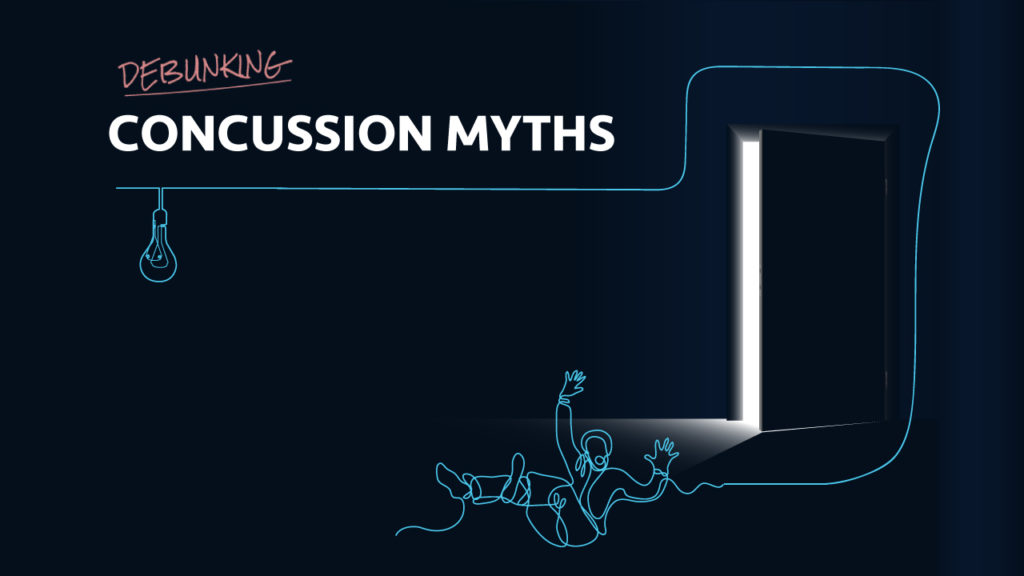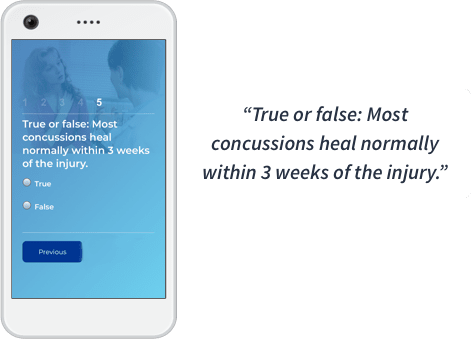Concussion Facts Infographic: 5 Myths Explained
Concussion Facts
- Falls, car accidents, being struck by or against an object, and assaults are all leading causes of concussion.
- Losing consciousness after a concussion is rare. More common symptoms include issues with memory, headaches, difficulty with bright light, irritability, nervousness, and changes in sleep.
- Complete cognitive and physical rest is recommended the first 24 to 48 hours following a concussion for the brain to begin healing.
- Current concussion treatment standards recommend a gradual return to life under the supervision of healthcare providers instead of extended rest in a dark room.
- About 80% of patients diagnosed with concussions recover within three weeks, while 20% experience lingering symptoms.

Top 5 Concussion Myths Debunked
We’ve come a long way with the amount of scientific research about concussions available. With so much new information, it’s important to separate the truth from fiction. Here are the top 5 myths debunked with concussion facts from the experts.
Concussion Myth #1: Sports injuries are the leading cause of concussions
Sports concussions, especially concussions in youth sports, are a hot topic in the media. However, it’s important to keep in mind that a head injury can occur outside of athletics too. According to the Centers for Disease Control and Prevention (CDC), falls are the number one cause of concussions followed by car accidents. This puts anyone at risk for a head injury, not just athletes who play contact sports.
You can protect yourself by learning the signs and symptoms of a concussion. This will help you know when to seek medical help if you suffer a blow to the head.
Concussion Myth #2: You must lose consciousness to have a concussion
Losing consciousness was once thought to be an indisputable sign of a concussion. Athletic coaches would use this as a point of reference to determine if a player was healthy to continue playing. The truth is, concussions without a loss of consciousness happen in 9/10 cases.
Coaches, parents, and athletes need to be on the lookout for other signs of a concussion, like dizziness, headaches, memory issues, and more subtle side effects. When it comes to the age-old question, “do you have to lose consciousness to have a concussion?” the answer is no.
Concussion Myth #3: Avoid falling asleep with a concussion
There is a common fear that if you sleep with a head injury you could slip into a coma or lose consciousness. However, sleep helps the brain heal and recover post-injury, especially in the first 24 to 48 hours. There are numerous studies analyzing sleep loss and deficits in neurocognitive performance that highlight the importance of uninterrupted rest.
As long as you don’t present danger signs like slurred speech, intense nausea, or increased confusion, it’s safe to sleep after a concussion.
Concussion Myth #4: Long rest in a dark room helps with recovery
Head injuries and rest have been debated time and time again. The “concussion dark room myth” is unsupported by evidence. Experts agree that the best concussion treatment and return to play protocols involve a gradual and progressive increase in activity. Research has also shown that moderate physical activity does not delay recovery time so long as you are following medical advice from a healthcare professional.
Rest in a dark room is okay when within the 24 to 48-hour window, but extended isolation from everyday tasks makes it that much harder to integrate back into normal life.
Concussion Myth #5: It takes months to recover from a concussion
Ten years ago, patients with a concussion diagnosis were told to get used to a new life. They wouldn’t be able to do the same activities and they might have some memory issues. However, there have been advances in concussion treatment. Research shows that only 20% of patients will have a concussion recovery time longer than three weeks. With the right treatment and rehabilitation, patients can get back to normal activities in less than a month.
The best way to prevent a concussion is to get educated. Learn the signs, symptoms, and resources that way you’re prepared. You can also take a baseline test to record healthy brain function. If you ever suspect a concussion, your doctor can use these results to help make treatment decisions.


